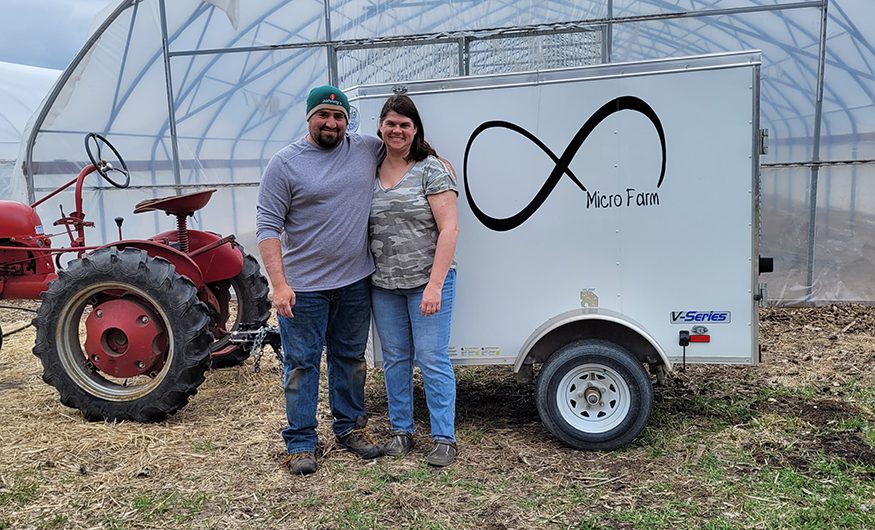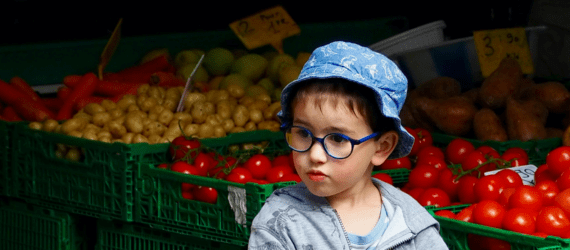By Todd Post
Increasingly in recent years, Bread for the World has been using a broad lens, one with a systematic view of hunger and its causes, to consider potential solutions to hunger. Bread has identified three elements of any effective “food system” (as experts call the series of steps, “from farm to fork,” involved in producing and bringing food to people). To end hunger for good, people must put in place local, national, and global food systems that embody these principles: nutrition, equity, and sustainability.
Infinity Microfarm in Missaukee County, a five-acre farm in the northern part of Michigan’s lower peninsula, is part of an effective local food system. Brice and Nikki Mosher own and operate the farm, which works within a Community Supported Agriculture (CSA) framework, bringing together a group of local people who support the farm’s work. As the U.S. Department of Agriculture (USDA) puts it, the farmland “becomes, either legally or spiritually, the community’s farm.”
The Moshers grow more than 30 varieties of vegetables, many of them not available in local grocery stores. They use mostly organic farming practices, which seems to be paying off. “Every year, the soil is better than the year before,” Brice says.
The couple supplies CSA shareholders with a box of fresh produce every week throughout the growing season, which stretches approximately half the year. The couple invite shareholders to visit the farm and learn more about the foods in their CSA boxes. In Brice’s estimation, nothing is more rewarding than watching a child who has never seen a fresh tomato pick one straight off the vine and marvel over how delicious it tastes.
The Moshers charge $20 per box of fresh fruits and vegetables. Thanks to a federal nutrition program called the Gus Schumacher Nutrition Incentive Program (GusNIP), about half of Infinity Microfarm’s CSA shareholders also participate in the Supplementary Nutrition Assistance Program, better known as SNAP.
The monthly benefits to help buy groceries stretch further for participants who are shareholders in Infinity Microfarm. They pay only $5 of the $20 cost, with the rest covered by GusNIP grantee the Michigan Fitness Foundation. It’s a great deal for both the families that participate in SNAP and the Moshers.
Beginning a decade ago with a pilot program in one county of Massachusetts, GusNIP is now nationwide and a permanent part of the farm bill. As yet, however, only a small fraction of the 41 million people who receive SNAP benefits have access to GusNIP incentives; a reasonable estimate would be about 1 million people.
There are excellent reasons for the U.S. government to support GusNIP. Independent evaluations show significant increases in fruit and vegetable intake as well as other positive outcomes. The program also benefits farmers who raise fruits and vegetables, most of whomare small-scale producers who get very little support elsewhere in the farm bill. The work of these farmers and the produce they grow are essential to improving the U.S. food system—and the nutritional status of our people.
The Moshers’ income from farming comes primarily from the CSA. Because GusNIP subsidizes the weekly produce purchases of SNAP households, it is possible for Brice to farm full-time. Nikki has a job in the school system and works on the farm on weekends and during the summer.
The Michigan Fitness Foundation uses its GusNIP grant from USDA to support 17 Farm-to-Family CSA programs for SNAP households throughout Michigan. The CSAs can be found in a variety of settings, from a dense urban center such as Detroit’s famed Eastern Market, to suburban communities and less populous rural areas like the ones served by the Moshers.
Farming in the United States is designed to reward economies of scale, i.e., very large farms. The Moshers and other small-scale farmers can rarely compete. It is often U.S. public sector initiatives, such as GusNIP, farm to school, farm to food bank, and other nutrition programs, that offer opportunities for small farmers to make a living. Those who wish to expand their operations will also find support.
The Moshers are not among those who plan to expand. They envision Infinity Microfarm as a community-building effort. Another part of that is maintaining a Facebook page for CSA shareholders to exchange recipes and advice on how to prepare some of the less familiar foods.
Farming is Brice’s second career, begun at the age of 41 after he left his job as an assistant plant manager at a sawmill. He’s quite content with what he has accomplished in the six years since then. He said that at his old job, it was not uncommon to work 70 hours a week. Farming also demands 70 hours a week, but here, he is not only working for himself but also helping to strengthen the local food system.
Todd Post is senior domestic policy advisor with Bread for the World.



